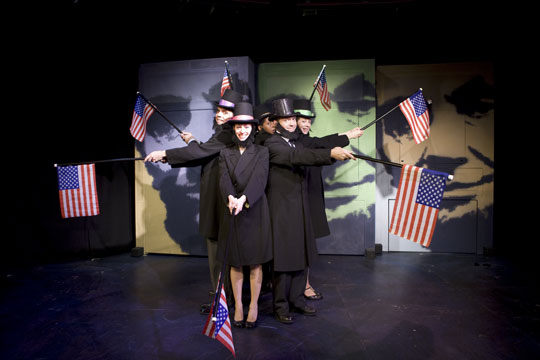Review: `Abraham Lincoln’s Big Gay Dance Party’

The cast of Aaron Loeb's Abraham Lincoln's Big Gay Dance Party performs an elaborate opening number in the SF Playhouse world-premiere production. Photos by Zabrina Tipton.
History, politics, utter zaniness collide in Honest Abe's `Dance Party'
««« ½
Aaron Loeb's world-premiere play Abraham Lincoln's Big Gay Dance Party at the SF Playhouse embraces adventurous theatricality. There's drama, comedy, dancing, politicized fourth graders, absurdity, murder, betrayal, romance, insanity, corruption, rampant homosexuality and even more rampant conservatism.
In short, this is an ambitious play that includes just about everything you can think of. By rights, the play shouldn't work. With so much going on, the focus should be shot and the play's intentions scattered all over the place.
But the great thing about Loeb, working with director Chris Smith (former artistic director of the Magic Theatre), is that he's a ferocious entertainer. As he demonstrated last year, also at the SF Playhouse, with First Person Shooter, he builds plays with a sort of maniacal energy that helps them careen from scene to scene and back again.
Abraham Lincoln, which opened Saturday, is above all else, a hugely entertaining show. The fact that it has something serious on its mind is less immediately apparent when the cast of seven – all dressed as Abraham Lincoln -- is performing an elaborate dance number (choreography by Kimberly Richards and Tom Segal) that pays goofy homage to the likes of Jerome Robbins and Bob Fosse.
There's even a gimmick afoot to complicate the proceedings. The cast invites the audience to vote on the order of the three acts (with two intermissions). As we hear about the "trial of the century" in Menard County, Illinois, we're asked if we want to hear first from the defense attorney, the prosecuting attorney or the reporter covering the trial for the New York Times.
On opening night we began with the defense attorney, Regina (Velina Brown), a black Republican senator with designs on the governor's office (hard to imagine anyone at this moment in history wanting to be governor of Illinois). Her mentor and dear friend, Tom (Joe Kady), a disgraced senator of the Regan vintage, has surprised her by wanting the governor's chair for himself.
Tom is using the bully pulpit of a county courtroom to stage his comeback. He's prosecuting a fourth-grade teacher (Lorraine Olsen) for allowing her students' Christmas pageant to claim that Abraham Lincoln liked to sleep with men and was likely in love with his friend Joshua Speed (as some historians have claimed).
 Not to be outdone by Tom's grandstanding, Regina and her trusty assistant, Tina (Sarah Mitchell), head for the cornfield county and proceed to play dirty and grab some headlines for themselves.
Not to be outdone by Tom's grandstanding, Regina and her trusty assistant, Tina (Sarah Mitchell), head for the cornfield county and proceed to play dirty and grab some headlines for themselves.
Loeb plays fast and loose with styles here. On Bill English's highly efficient, Lincoln-plastered set full clever compartments and cupboards, action shifts quickly. We have realism in the offices of the politicos, then we have broad slapstick, as with the members of the press. The hayseed reporter, Sparky McGee, is a rube with flashes of brilliance. The blogger is a Bluetooth-y ass. And the New York Times reporter, Anton (Mark Anderson Phillips, above right, with Michael Phillis), arrives wearing a kingly cape amid reverent huzzahs.
It turns out that Anton will become an actual character in this drama, and his story was the second one we saw on opening. He arrives in Menard with his best gal pal, fashion photographer Esmeralda (Brown again in a zesty comic performance) and immediately makes a beeline for Tom’s pie shop-owning son, Jerry (Michael Phillis). If Tom is so insistent on continuing the gay witch hunt he began in the Reagan administration, Anton is going to make sure there are no useful secrets in the former senator’s family closet.
Anton’s story is the most poignant of the three because of his interaction with Jerry, a sensitive young man trapped by family in a painfully untenable situation. The two men have a heated scene in the thick of a corn field (English’s set triumphs yet again), and Loeb’s writing crackles with intelligence and intensity.
The third act on opening night was told from Tom’s point of view, and this proved to be the trickiest of the trilogy. Tom’s anti-gay crusade is never fully explored, and as issues of mental health enter into the picture, his motives become even fuzzier. Still, Kady gives an extraordinarily full performance as the troubled family man who isn’t above hiring a Karl Rove-like operative (Brian Degan Scott) to smooth the way to the governor’s office.
It’s hard to overstate the skill of this ensemble. Everyone plays multiple roles, and they all zip from comedy to drama and back (not to mention all the dancing) with ease. They all have individual moments to shine, but the greatest impression comes from their work together. There’s real connection here, and that’s another element that helps this scattershot approach adhere.
That said, Phillips and Phillis do extraordinary work together, and their characters both end up being far more interesting than first impressions would indicate.
Through it all, Loeb keeps returning to Abraham Lincoln, whose iconic visage permeates the entire production, both in serious and comic ways. A statesman, a humanitarian, an enigma and, perhaps most importantly, an American, Lincoln lends a certain gravitas to the evening. Even at its zaniest – and things do get zany – there are serious issues, both political and personal, being thrown around.
But here’s the thing: Loeb and this fantastic production aren’t on any soapbox. They’re throwing an all-American bash, and we’re all invited.
FOR MORE INFORMATION:
Abraham Lincoln's Big Gay Dance Party continues through Jan. 17 at the SF Playhouse, 533 Sutter St., San Francisco. Tickets are $40. Call 415-677-9596 or visit www.sfplayhouse.org.